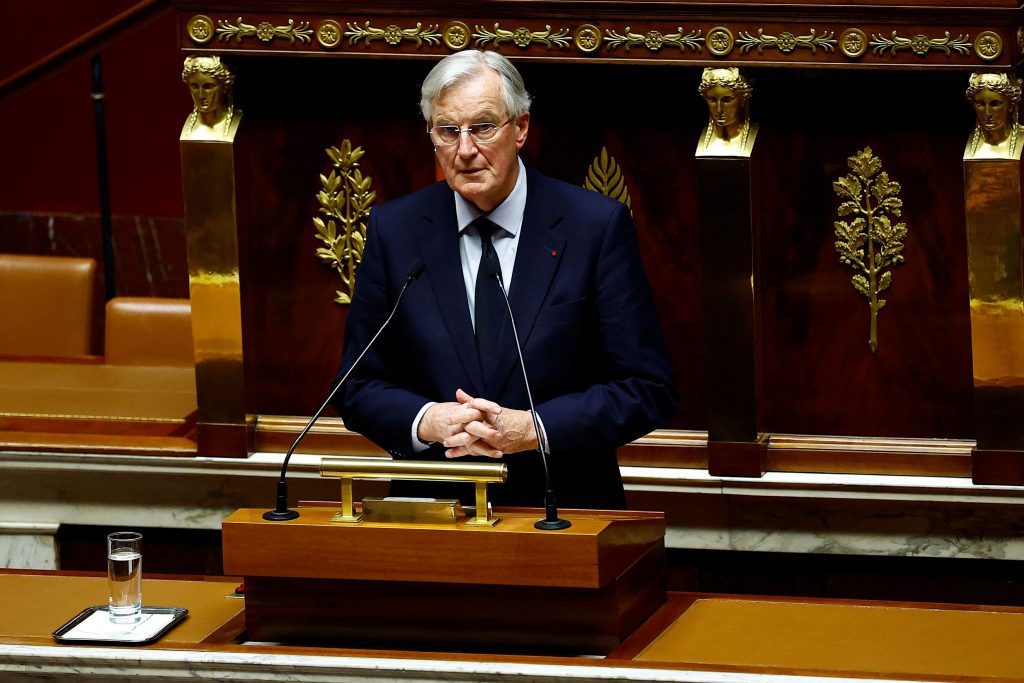PARIS—Anti-immigrant leader Marine Le Pen is engaged in a high-stakes game of chicken with the French government and a multitude of global investors who finance the country’s sizable debt load.
For weeks, the French public and markets have hung on Le Pen’s every word for indications of whether she is willing to follow through on her threats to topple the government if it doesn’t soften the impact of its planned budget on taxpayers.
Now a moment of truth has arrived. On Monday, Prime Minister Michel Barnier rammed a section of the government’s budget through the National Assembly by exercising article 49.3 of the French constitution. Barnier doesn’t have the votes to garner a majority in the badly splintered lower house , where Le Pen’s far-right National Rally holds the balance of power. So he is essentially daring Le Pen to respond with a no-confidence vote in the days to come that would kill the budget and, Barnier warns, unleash a run on France’s sovereign debt.
French stocks have fallen sharply in recent weeks, and the premium investors demand to hold the government’s long-term debt has risen to its highest since the eurozone debt crisis of 2012. France’s borrowing rate has in recent days eclipsed that of Greece, the eurozone’s perennial fiscal laggard.

French Prime Minister Michel Barnier’s budget requires billions in spending cuts and tax increases. REUTERS/Sarah Meyssonnier
The standoff provides an acid test of whether Le Pen and her ranks have the credibility to ultimately replace decades of rule by France’s political establishment , including President Emmanuel Macron whose term ends in 2027. Macron and his allies have long argued that Le Pen lacks the knowledge and skill to manage the second-largest economy in the eurozone and that her rise to power would shake investor confidence in France to its core.
For Le Pen, the front-line of this battle is the cost-of-living crisis that has weakened the working- and middle-class. Barnier’s budget demands 60 billion euros in spending cuts and tax increases—equivalent to $63.5 billion—to narrow France’s deficit, which is projected to reach more than 6% of gross domestic product this year, double the European Union’s limit. Macron’s tax cuts for corporations and households—in addition to significant subsidies to counter the Covid-19 pandemic and a surge in energy prices after Russia invaded Ukraine—blew a hole in France’s public accounts that only became apparent this year, stunning both investors and voters.
“We won’t let the French be robbed to make up for the mistakes of seven years of Macronism,” Le Pen said Sunday. She acknowledges the need to narrow the deficit but she wants it done without measures—such as electricity-tax increases and delays to pension increases—that impact her base. Instead, she wants France to slash its contributions to the EU; cut medical aid for foreigners; and further reduce international development aid.
Le Pen is flexing her muscles at a time when her political future is imperiled. She has been charged with embezzlement in a trial that is expected to reach a verdict at the end of March. Prosecutors allege her party used close to €7 million that was earmarked for assistants working inside the Strasbourg-based European Parliament—to pay party staffers in other parts of France between 2004 and 2016.
Last month, prosecutors requested a five-year prison sentence and a five-year ban from public office, an outcome that would prevent her from running for president in 2027.
“It’s revolting,” Le Pen said in a TV interview, adding that prosecutors “are asking for a political death penalty with immediate execution.”
Le Pen denies any wrongdoing, saying assistants funded by the European Parliament divided their time between EU and party work, then a common practice among parliamentary aides.

French far-right leader and member of parliament Marine Le Pen, President of the French far-right National Rally (Rassemblement National – RN) party parliamentary group, talks to journalists after the announcement by the French Prime Minister of the use by the French government of article 49.3, a special clause in the French Constitution, to push the budget bill through the National Assembly without a vote by lawmakers, during a debate on the 2025 Social Security Financing bill (PLFSS) at the National Assembly in Paris, France, December 2, 2024. REUTERS/Sarah Meyssonnier
In the budget battle, Le Pen has a series of moves available to her. She has the option of holding her fire during Monday’s showdown in the National Assembly. Barnier is expected to use article 49.3 to pass a section of the budget that finances pensions, healthcare and child-care benefits. If his government survives, he will then be under pressure to pass the rest of the budget by the end of the year, setting up the possibility of subsequent no-confidence votes before the end of the month.
Le Pen’s brinkmanship carries acute political risks. As Le Pen has expanded her influence in the National Assembly—reaching 124 seats in the 577-seat house after this summer’s snap elections—she has steered her lawmakers away from blatant rabble-rousing measures. Instead, she has encouraged them to cast votes that show her party is responsible and ready to carry the mantle of government.
Casting the deciding votes that bring down Barnier’s government would mark a shift in tone. It would require Le Pen to join a leftist coalition of lawmakers, which ranges from the Green Party to the far-left France Unbowed, who are planning to call for a no-confidence vote to be held by Wednesday. And it would raise questions about how France would go about collecting taxes and paying millions of government workers without a budget in place for 2025.
“If I fall, the government stops, and what happens?” Barnier said recently. “There will be a storm, probably quite severe, and turbulence on financial markets,” he added.
Le Pen says Barnier is simply engaging in scare tactics to strengthen his hand at the negotiating table. If the government is forced to resign, she says, lawmakers could pass a special law to effectively carry over the previous year’s budget for a few months and avoid a government shutdown.
Her demands are manifold. She wants the government to scrap a proposed tax increase on electricity. She also wants Barnier to abandon his plans to delay increases in pension payments and to lower drug reimbursements.
Barnier agreed to scrap the electricity tax last week. On Monday, his office said the budget won’t include cuts to drug reimbursements following a phone call between Barnier and Le Pen. Barnier has made some concessions on pension payments that Le Pen says don’t go far enough. She said on Monday she had submitted an amendment to the budget to increase pensions next year in line with inflation.
“It’s up to the government to accept or reject it,” Le Pen said.
Write to Noemie Bisserbe at noemie.bisserbe@wsj.com and Stacy Meichtry at Stacy.Meichtry@wsj.com


